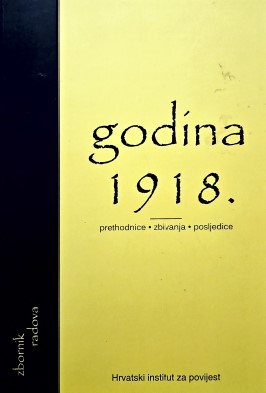Bosna i Hercegovina u Kraljevstvu Srba, Hrvata i Slovenaca, s posebnim osvrtom na stanje u Hercegovini (1918.–1921.)
Bosnia and Hercegovina in the Kingdom of Serbs, Croats, and Slovenes, with particular regard to the situation in Hercegovina (1918–1921)
Author(s): Ivica Lučić
Subject(s): Political history, Government/Political systems, Political behavior, Nationalism Studies, Pre-WW I & WW I (1900 -1919), Interwar Period (1920 - 1939), Inter-Ethnic Relations, Politics and Identity
Published by: Hrvatski institut za povijest
Keywords: Austro-Hungarian Monarchy; Bosnia, Herzegovina; Serbs; Croats; Slovenes; kingdom; nation; state;
Summary/Abstract: With the outbreak of the war and the collapse of the Austro-Hungarian Monarchy Bosnia and Hercegovina became a centre of “national concentration” and the newly proclaimed state. The government of the Kingdom of Serbs, Croats, and Slovenes was taken over by the Serbian political elite which ascribed to Bosnia and Hercegovina the role of a unified area which would prevent the creation of any kind of Croatian state while strengthening the newly created state and the Serbian dominance within it. The new government established its authority through terror and violence directed against the non-Serbian peoples. It attempted to undermine every political action or publicly expressed demand of the Croats for a federal unit, or an independent state. Mu-slims saw their land confiscated through the Agrarian Reform, which while in part brought to an end feudal relations and corrected historical injustices, also materially ruined numerous families. In harmony with Serbian political tradition the Constitution and other agreements merely acted as “manifestations” to appease “European public opinion.” The interests of other (non-Serbian) peoples were treated as illegitimate or anti-state activities: nationalism and separatism. Various repressive measures were directed at individuals deemed to be the carriers of these interests. Territories in the new state toward which the government lacked sympathy for national or political reasons and which did not figure into particular plans for unitarism were systematically destroyed and neglected. The key argument for unitarism and centralization was a call to the rights and “decisiveness” of the Serbian people, which was intermixed among the others to bring them to “belong to Serbia.” In this spirit the Vidovdan Constitution was brought into being which eliminated historical rights and historical lands, and created the basis for further unitarism and centralization of the state, but likewise strong reasons for dissatisfaction and resistance. States are determined by the nature of their formation. The Kingdom of Serbs, Croats, and Slovenes came into existence due to historical circumstances as an intellectual creation and not the result of national development. Primarily, violence was used to impose “unity” and centralized government.
Book: Godina 1918. Prethodnice, zbivanja, posljedice
- Page Range: 207-246
- Page Count: 40
- Publication Year: 2010
- Language: Croatian
- Content File-PDF

